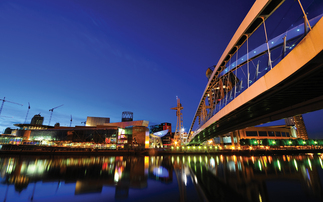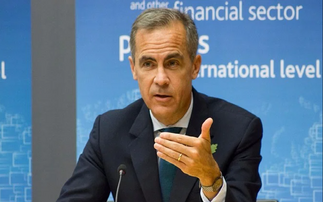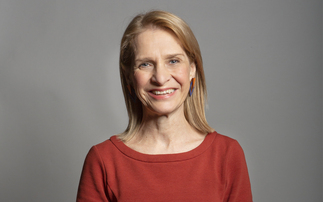DECC insists change from minister of state for climate change to undersecretary of state for climate change 'doesn't make any difference' to government's approach
Green businesses and campaigners have today expressed disquiet at the apparent downgrading of the government's climate change minister role, warning this week's wide-ranging reshuffle could further dilute the Conservative Party's commitment to tackling climate risks.
Amber Rudd was yesterday appointed as parliamentary undersecretary of state for climate change, with responsibility for a host of environmental issues, including energy efficiency, national and international climate change talks, the Green Investment Bank, the Renewable Heat Incentive, and the UK's carbon budgets. The Department of Energy and Climate Change (DECC) website confirms her remit is nearly identical to that of former climate change minister Greg Barker. But she will not take on his job title as minister of state for climate change and, in echoes of the controversy surrounding Baroness Stowell's appointment as the new Leader of the House of Lords, Rudd can presumably expect to be on a salary that is about £10,000 lower than her male predecessor.
Announcing the appointment on Twitter yesterday, David Cameron glossed over the change in title, declaring that Amber Rudd was the "new minister at Department for Energy and Climate Change". BusinessGreen understands that the change in job title compared to Barker was primarily the result of a cap on the number of full ministers of state across government and that Rudd is regarded as a like-for-like replacement within Downing Street.
However, one green business source said the decision not to appoint a minister of state to the role was "very odd and not particularly helpful", while a spokesman for Friends of the Earth said it was "slightly concerning" and "another indication that climate change is not front and centre for David Cameron". A separate green business source said the reshuffle was "deeply frustrating from both a long and short-term perspective", adding that it would inevitably delay the development of a number of green policies while also seeing a reduction in the number of green champions within government ranks following the departure of Barker and foreign secretary William Hague.
A spokesman for Greenpeace similarly expressed concerns about the downgrading of the climate change minister post and the failure of Cameron to send a stronger signal about his commitment to climate-related issues. "There is an obvious risk that in the run-up to the election, the government will prioritise spin and optics above real-world challenges - and certainly some will see the downgrading of this post as part of that trend," he said. "The international community and the public now need a signal from David Cameron that he is not trying to brush the issue of climate change under the carpet. A good start would be attending the Ban Ki-moon summit in September, and making it clear that his newly appointed ministers in the Foreign Office, DECC, DEFRA and DFID have his full support in pushing for climate progress on the international stage."
DECC categorically rejected the suggestion that the reshuffle marked a downgrading of the importance attached to climate change issues or the climate change minister role. "It doesn't make any difference," said a spokesman for the department, adding that it was "something of an anomaly" that DECC had previously had two ministers of state and it was perfectly normal for a department of its size to operate with one minister of state and several parliamentary undersecretaries. "People would be wrong to read anything into it," he said. "It is not a downgrade of the brief or responsibilities at all."
However, disquiet remains in green business circles about the change to the climate change minister role and the general impression created by the reshuffle. DECC is now operating with a secretary of state in Ed Davey, a minister of state shared with the Department for Business in Matt Hancock, and two undersecretaries in Rudd and Baroness Verma. Consequently, concerns remain in some quarters that the team could easily become stretched as international climate negotiations intensify later this year and the government's electricity market reform programme gathers pace. "The next nine months is a crucial period for climate policy, and it's very important that the department is resourced accordingly to deal with this," said a spokeswoman for trade association RenewableUK. "We're not sure why the role of climate change minister has become a parliamentary undersecretary role, but hope that this doesn't signify any broader change in attitude to the import of climate change."
Others predicted the new ministerial team would struggle to deliver much in the way of policy progress between now and next May's election. "There is no way ministers will be able to come in and enact any serious policy before the election," said one green business insider, arguing that all the new ministers at DECC and Defra would face a major challenge getting up to speed on policy details in a year when they also have to defend their constituencies. "We need to give them a chance, but it is hard to see how changes at this stage in the parliament won't lead to further policy delays," they said.
Fears about the impact of the reshuffle on the green economy extend beyond the minutiae of ministerial rankings, with various reports this week detailing how Hancock and incoming environment secretary Liz Truss have in the past expressed opposition to renewable energy projects, challenged the current approach to subsidising clean energy, and struck a gung ho note on shale gas development plans.
One green business insider suggested several of the new intake of DECC and Defra ministers were known to have close ties to chancellor George Osborne and seemed to share his concerns about clean energy costs and the value of ambitious action on climate change. However, they also questioned whether their stance on clean energy would have much of an impact this side of the election. "There are reports suggesting the reshuffle tightens the Treasury's grip on DECC, but that would imply Treasury doesn't own DECC already," they said. "[Outgoing energy minister Michael] Fallon was from the same school of thought and not much changed under him, so I wouldn't expect much to change through to the election. However, beyond that we could end up with a Conservative government that is significantly more hostile to the environment and renewables."
However, others saw considerable cause for optimism in the promotion of Conservative ministers from the 2010 intake. One insider with links to Whitehall said Hancock promised to be significantly more interested in the green economy than Fallon, who was described as "much more sceptical on climate change than he let on in public". Similarly, Maria McCaffery, chief executive at RenewableUK, yesterday welcomed Hancock's appointment and praised his work in supporting green skills development. "The jobs of the future are in green energy, and with a dual remit across the Department for Business, Innovation and Skills and the Department of Energy and Climate Change, Mr Hancock will be poised to ensure that these tens of thousands of jobs are realised," she said.
Alastair Harper at think tank Green Alliance also suggested Truss could deliver a boost to the waste and recycling sector by delivering a renewed emphasis on resource efficiency at Defra. "There is potential for Truss to be much more focused on resource efficiency," he said. "She has a track record of interest in how to build a strong and efficient economy and there are lots of policy levers at Defra that can help achieve that."
Privately, Truss, Hancock and Rudd have all been praised by green business sources for being broadly supportive of the need to decarbonise and tackle climate change risks, even if they have not pronounced publicly on the topic very often in the past.
Intriguingly, there were also rumours circulating this morning that Rudd was told by the prime minister to use her new role to make sure that the Conservatives do not let their green credentials slip.
However, not everyone is convinced that green credentials were at the forefront of Cameron's mind as he undertook this week's reshuffle. "It sends out a pretty clear signal that we can expect very little from this government on the green agenda before the election," said one business source. And what of the changing ministerial job titles at DECC? "It just looks really bad," they added.










